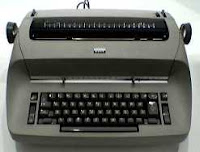A couple of days ago, I sent her a list of organizational and wording changes, though she wasn’t able to incorporate them in time for an interview she had scheduled. But that was okay, she wrote, because, “a resume is NEVER done.”
Right!
When I was a sophomore in high school, I took typing from a teacher named Coach Ron Bradley. I had just started wearing glasses for reading (still do, though my distance vision remains 20-20), and he called me four eyes. I never forgave him for that, but I did master the QWERTY keyboard by touch, a skill that stood me in good stead over many decades and several career changes.
I’m a lover of technology, a major geek, but lately I’ve been wondering whether my zippy new Toshiba laptop with four gigs of RAM and a 320-gig hard drive is a mixed blessing.
When I went off to college, I took a manual typewriter, which lasted for several years, until I replaced it with an IBM Selectric. I wrote term papers, job application letters, vitas, a Master’s thesis, and a Ph.D. dissertation on that trusty machine.
I’m an obsessive reviser, and my satisfaction with what I’ve written usually doesn’t last long before I start hacking away at what’s supposed to be a fait accompli.
And, oh, is my laptop an enabler. Back in the day, when I wrote my dissertation, I started with a pen and a tablet. After reducing the individual chapters to near illegibility with inky arrows, squiggles, and numbered annotations that covered the backs and sides of each page, I rolled a blank sheet of paper into my Selectric (sometimes with multiple pieces of carbon paper, if blue smudged copies were required) and began typing.
I was finished, or I’d better be, since changing words, let alone moving whole paragraphs around, was impossible without retyping everything.
I’m not sure whether that sense of finality made me a better writer, but it most definitely put a damper on second thoughts. The words were committed to paper, and there was no going back.
Nowadays, I often long for the simplicity of my Selectric. Why? Because nothing I write is ever “done” anymore.
This editor tells me the climax of one of my novels doesn’t fit well with what comes before. I ponder what she has to say and decide she has a good point. So I whip out my laptop, cut, paste, move, reassemble. Voila! A brand new ending.
That editor says a story line in another of my novels isn’t compelling enough and ought to be trimmed down. Again, I put on my thinking cap, realize I agree with her, get out the virtual scissors, and start cutting. Objection answered.
The upshot of all these constant repairs is that the finish line keeps getting farther and farther away. No matter how good my distance vision is, I can’t see it. Or maybe it doesn’t exist at all. Maybe it’s like that proverbial lime Jell-O; it simply can’t be nailed to the wall.








No comments:
Post a Comment